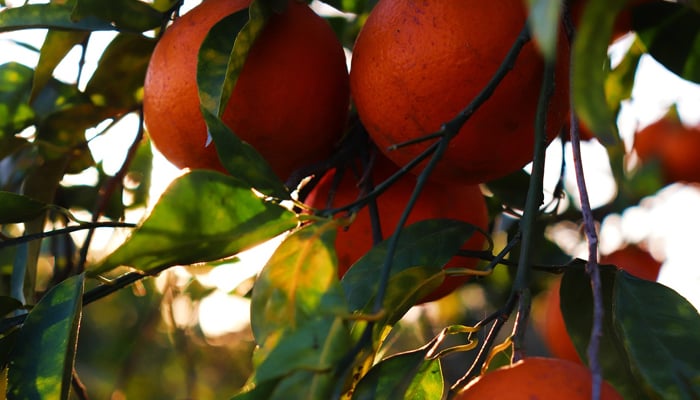Kinnow industry faces collapse as exports plummet by 50 percent
KARACHI: Kinnow industry, a major source of income and employment for the country, is in crisis as exports of the citrus fruit are expected to drop by 50 percent this year due to quality issues, industry officials said on Monday.
Exports of Kinnow, worth $220 million, are at risk as the current variety of the fruit, introduced 60 years ago, has lost its natural resistance to diseases and climate change, leading to lower yields and quality, the All Pakistan Fruit and Vegetable Exporters Association said.
"The five-month season has shrunk to just 1.5 months, and half of the 200 Kinnow processing plants have closed, threatening the Rs300 billion invested in these facilities and the livelihoods of 400,000 people," Waheed Ahmed, the patron-in-chief of the association, said.
"We fear that if the situation continues, Kinnow exports from Pakistan may cease within the next two years."
He said Pakistan used to earn $220 million from exporting 450,000 tonnes of Kinnow, but this year's volume is likely to be limited to 150,000 - 250,000 tonnes, generating only $100 million in revenue.
Ahmed said the current Kinnow variety has exceeded its lifespan, and the lack of new varieties threatens Pakistan's position in citrus fruit exports. Sargodha and Bhalwal regions of central Punjab, known for producing the tasty Kinnow, are facing a crisis.
He called on the government to focus on developing new varieties to avoid a crisis that could jeopardize millions of jobs and billions in foreign exchange.
Ahmad said the quality of Kinnow has deteriorated, with skin spots and reduced shelf life, leading to rejected export shipments, causing financial losses to both exporters and importers.
"The association has been raising concerns with the Punjab government, the federal ministry of national food security and research, and related agricultural research institutions for six years, but the response has been inadequate."
He urged the government to pay attention to new citrus fruit varieties, including early, middle, and late varieties, to combat the effects of climate change. He suggested that cultivating these new varieties could potentially boost citrus fruit exports to $300 million after five years, reaching $1 billion within the next decade.
Ahmad also recommended that the government adopt successful strategies from countries like China, Turkey, Egypt, Morocco, and the U.S. to revive the citrus fruit industry in the country.
-
 The Pope Breaks His Silence On Iran Attacks: Breaking
The Pope Breaks His Silence On Iran Attacks: Breaking -
 US On High Alert After Overnight Joint-military Strikes On Iran: FBI
US On High Alert After Overnight Joint-military Strikes On Iran: FBI -
 Prince William 'frustrated' By Delay In Major Move Against Andrew
Prince William 'frustrated' By Delay In Major Move Against Andrew -
 BLACKPINK's Rose Makes K-pop's History With Major Win
BLACKPINK's Rose Makes K-pop's History With Major Win -
 Noel Gallagher Gives Shut-up Call To Critics After Receiving BRIT Award
Noel Gallagher Gives Shut-up Call To Critics After Receiving BRIT Award -
 Pentagon Used Anthropic’s Claude AI In Iran Attack Despite Ban: Report
Pentagon Used Anthropic’s Claude AI In Iran Attack Despite Ban: Report -
 Nvidia Teams Up With Telecom Firms For AI Driven 6G
Nvidia Teams Up With Telecom Firms For AI Driven 6G -
 SpaceX Launches 25 Starlink Satellites On Its Falcon 9 Booster From The West Coast
SpaceX Launches 25 Starlink Satellites On Its Falcon 9 Booster From The West Coast -
 Expert Reveals What Makes Investigations Hard In Search Of Savannah Guthrie Mother Nancy: 'Silent Witness'
Expert Reveals What Makes Investigations Hard In Search Of Savannah Guthrie Mother Nancy: 'Silent Witness' -
 'SNL's Strongly Reacts To BAFTA's Racial Slur With Tourette’s Sketch
'SNL's Strongly Reacts To BAFTA's Racial Slur With Tourette’s Sketch -
 Austin Shooting Leaves Multiple Dead, Dozens Injured
Austin Shooting Leaves Multiple Dead, Dozens Injured -
 Meghan Markle Friends Break Silence As Duchess Plan To Return To UK
Meghan Markle Friends Break Silence As Duchess Plan To Return To UK -
 Dua Lipa Stuns Everyone On And Off Stage At 2026 BRIT Awards
Dua Lipa Stuns Everyone On And Off Stage At 2026 BRIT Awards -
 2026’s Most Visited Websites Revealed: ChatGPT Overtakes Major Platforms
2026’s Most Visited Websites Revealed: ChatGPT Overtakes Major Platforms -
 Worst Cricket Moments That Shocked The Game
Worst Cricket Moments That Shocked The Game -
 Prince Harry, Meghan Markle Reach A Crossroads: ‘You Could Lose Everything’
Prince Harry, Meghan Markle Reach A Crossroads: ‘You Could Lose Everything’




